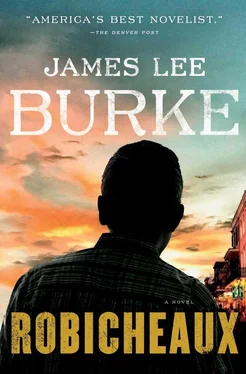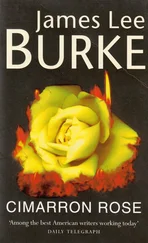I picked up a fallen tree branch and hooked it on the pirogue’s bow and scraped it onto the bank. There was a paddle inside, an empty rucksack, a minnow bucket, a newspaper that was two weeks old, and a fish stringer. My earliest memories of my father were fishing with him in a pirogue. There is no more emblematic symbol of life on Bayou Teche than the humble pirogue.
I stepped into the pirogue and steadied my weight, then eased down on the wood seat. The fog was so thick that the lights in the houses along the bayou, even the floodlamps in the backyard of the Shadows and the warning lights on the drawbridge at Burke Street, were hardly more than smudges. I shone the penlight on the rucksack again. A pint bottle of brandy lay in a half inch of rainwater. I touched it with the penlight beam and watched its color flare on my hand and wrist. I pushed with the paddle until the pirogue swung into the current and began to drift toward the bridge and one of the places that had been waiting for me since I was a child, when, in my innocence, I believed the paradisiacal world into which I had been born would always be there for me.
This particular bar-and-grill was located on the water, but because of the fog and the intermittent rain, the chairs and tables on the deck had been stacked, and all the patrons had gone inside and crowded into the bar. The windows were lighted, the glass beaded, the patrons happy and warm, safe from the elements. The only problem I had with this place upstream from the drawbridge was that almost everyone there knew me and my history.
When I opened the door, the bartender looked at me without speaking. I pointed at the men’s room. He smiled. “Yeah, go ahead, Dave,” he said.
I went into the cubicle inside the restroom and shut the door. I waited until I was sure the room was empty, then exited the cubicle and clicked off the light to lessen my visibility and opened the restroom door and went to the end of the bar in the shadows. A young barmaid I didn’t recognize was filling the beer box.
“One of those and two shots of Jack on shaved ice,” I said. “In fact, make that two doubles. I got a friend coming.”
She was pretty and young and had a small red mouth and the amber-colored hair characteristic of many Cajun women. “Aren’t you...”
“Aren’t I who?”
“You know, a policeman. You work in the big building on the bayou. I seen you when I paid a traffic ticket there.”
“Yeah, that was probably me. I’m kind of in a hurry.”
“Don’t set your pants on fire, no.”
I stood by the stool. I looked at my hands. I looked down at the bar rail. I could feel a hundred eyes burrowing into my back or the side of my face. When I looked up, no one was paying me any attention. “Miss, I’d really appreciate it if you’d hurry.”
“Yes, suh, coming up,” she said.
After I finished both glasses of whiskey, chasing each with Heineken, I thought my knees would fold.
“You gonna be all right?” the barmaid said.
“As right as rain.”
“You don’t look it, no.”
“You’re an honest lady.”
“No, I ain’t. I just don’t want to have to clean up the flo’.”
“See, that’s honesty.”
She leaned in. “You ain’t driving, you?”
“What’s your name?”
“Babette Latiolais.”
“I wish there were a million like you, Miss Babette. Give me a Heineken for the road.”
I pushed a twenty to her with the heel of my hand and left the change on the bar, then went outside into the fog and rain and started walking home. The drawbridge at Burke Street was in the air, a tugboat working its way up the bayou, its running lights on. I waved at the man in the pilothouse. I saw him draw in on his pipe and wave back. I wanted to have a drink with him. I wanted to be on his boat and sail back into time and find a place where there were no clocks or calendars. I wanted to find the vortex that some say is the birth canal and others say is the conduit to eternity. I wanted to find the cowled figure that awaits us all and wrap myself in his cloak.
I remember reaching my front yard and starting my truck with the intention of driving to St. Martinville, the village where the ghost of Evangeline supposedly waited for her lover, Gabriel, under a spreading oak on the banks of Bayou Teche. My next memory is of headlights in my mirror and the grinding sounds of a vehicle on my bumper.
I woke in my skivvies, on top of the sheets, the sun in my eyes. When I sat up, a wave of nausea drained through my body. My elbows hurt and my knuckles were scraped, and one fingernail was broken all the way to the cuticle. My clothes were on the floor. The sleeves of my windbreaker looked like they had been raked by barbed wire. I threw up in the bathroom, the backs of my legs shaking.
I got into the shower and turned on the water as hot as I could stand it, filling the room with steam, boiling the grease out of my pores, as though trying to scour an obscene presence from my skin. I touched a painful bump under the white patch in my hair and another bump on the back of my head. I shaved and brushed my teeth and gargled with antiseptic and tried to remember where I had gone and what I had done the previous night. My memory would go no deeper than the blinding glare in the rearview mirror, the smash of a bumper against the rear of my truck, and my head snapping back.
No, I remembered something else. A man’s face. His teeth were wide-set, his throat and cheeks patinaed with whiskers that were as stiff as emery-wheel filings.
I looked into the bathroom mirror. My face was bloodless and gaunt and dissolute, my eyes swollen, my hair a tangle of snakes. I scrubbed my face with cold water and looked again and saw an image that could be compared only with the severed head of a Mongol warrior.
I dressed in a long-sleeve red silk shirt and gray tie and gray slacks and oxblood loafers and got to the department at five to eight. I had never felt so sick. I filled a Styrofoam cup with coffee and burned my mouth on the first sip. Helen stopped me in the hallway before I could make it to my office, where I hoped to recover in solitude from my hangover. “Drink up, Pops. We’ve got a homicide.”
“Where?” I said.
“Just this side of the St. Martin line.”
“A shooting?”
“Mixed reports. The coroner is on his way. Dump the coffee.”
“I’ve got to use the men’s room.”
“You don’t have one at home?”
“I got a bug.”
Her eyes wandered over my face. “I’ll bring a cruiser around. Get your shit together.”
“Pardon?”
“You haven’t been fooling anyone.”
She walked away, her back stiff with anger.
Helen drove up the two-lane toward St. Martinville without speaking, the flasher rippling. I looked out the window at the cane fields flying by, the sun spangling through the canopy of oaks that arched over the highway. “Who’s at the scene?” I asked.
“Spade Labiche.”
“What’s he doing out here?”
“He was investigating a domestic battery charge. He got patched in.” She waited for me to reply. “What?”
“Nothing.”
“You don’t like him?”
“I don’t have an opinion.”
“Dave, what is wrong with you? Why not put one in your mouth and be done with it?”
“I’m going to hit a noon meeting.”
“What you’re going to do is your goddamn job.”
“Whatever you say.”
“I’ll stop the cruiser and stomp the shit out of you.”
“I believe you. I’m sorry.”
“I don’t have words for how I feel. You break my heart.”
I knew I would hear that last one in my sleep.
We turned onto a road that made a wide bend through sugarcane fields and cattle pasture, and passed clumps of pecan and oak trees and boxlike farmhouses and trailers and a convenience store that sold live bait. Just past the convenience store, a pale blue pickup truck was parked in knee-high weeds thirty feet beyond a broken wire fence. Both doors were shut. Crime scene tape had been strung from the fence posts to a solitary oak beyond the truck. The tape was bouncing in the wind.
Читать дальше












